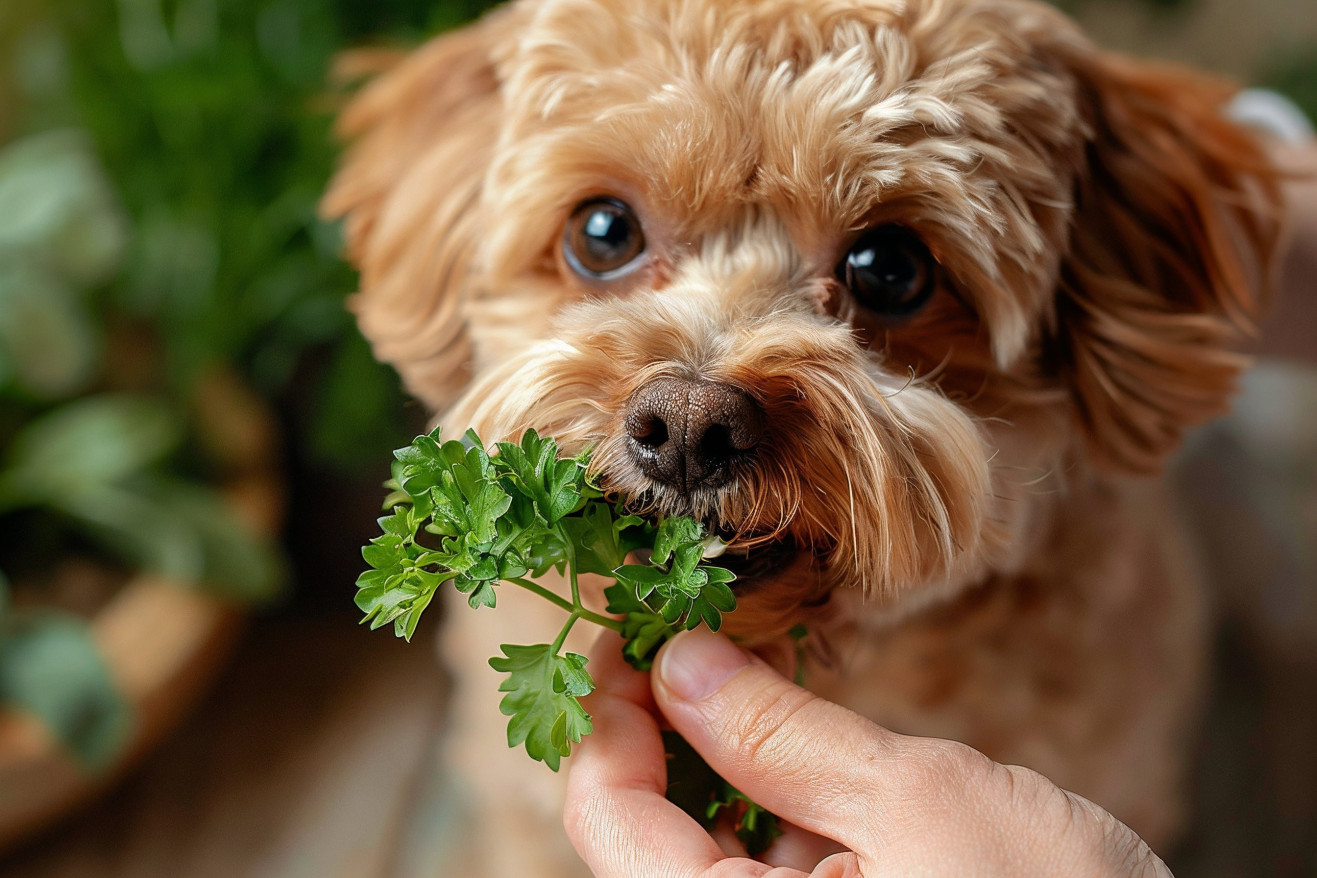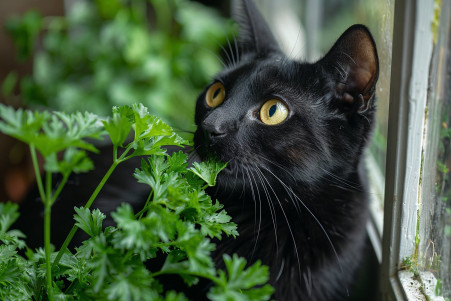Can Dogs Eat Parsley? A Comprehensive Look
14 April 2024 • Updated 13 April 2024

If you're someone who loves to use fresh parsley in your cooking, you may be wondering if it's OK to give some to your dog. The good news is that dogs can eat parsley in small amounts and it can even be good for them in some ways. However, it's also true that parsley can be harmful to dogs if they eat too much of it, so it's important to be careful.
This article covers a range of research and expert opinions to help you better understand the potential dangers and benefits of giving your dog parsley. By the end, you'll have the information you need to decide whether or not you want to add parsley to your dog's diet and, if so, how to do it in a way that's healthy and safe.
Can dogs eat parsley?
Nutritional Benefits of Parsley for Dogs
Parsley is a nutritional powerhouse that offers a variety of health benefits for dogs. It is rich in vitamins A, C, and K, and contains the antioxidants apigenin and myricetin, which have been shown to have cancer-fighting properties, says Dr. Peter Dobias. It also contains a lot of chlorophyll, which can help detoxify and oxygenate the blood, and folic acid, which is important for cell division.
Parsley's anti-inflammatory and antimicrobial properties can help dogs with arthritis and urinary tract infections. It also acts as a diuretic, which can help with detoxification and kidney health, and can help the body eliminate waste and bacteria. In addition, parsley's vitamin K content can help improve blood clotting and support liver function.
In addition, parsley's chlorophyll and antimicrobial properties can help improve digestion and reduce bad breath in dogs. With its rich nutrient profile, including vitamins, minerals, and other beneficial phytonutrients, parsley is a great addition to a dog's diet and can help support their overall health.
Safe Dosages and Ways to Serve
Because of parsley's diuretic properties and potential toxicity in high doses, it should be given to dogs in small amounts, says Extreme Electric Dog Fence. Dosages are typically between 1/4 to 1/2 teaspoon of dried parsley per 10 pounds of body weight, according to Preventive Vet.
Fresh parsley can be chopped up and added to a dog's regular food or homemade treats, according to The Dog People by Rover.com. It can also be made into a tea or juice for dogs with arthritis or urinary problems. However, it's important to note that dogs should not be given the seeds or roots of the parsley plant, which could be poisonous, says Dogster.
Potential Risks and Precautions
Although parsley can be a healthy addition to your dog's diet, there are some potential risks and precautions to consider. According to Parsley Poisoning in Dogs, parsley contains furanocoumarin, which can be toxic to dogs in high doses. This can cause skin irritation, photosensitivity, and gastrointestinal problems.
In addition, parsley is high in oxalates, so dogs with kidney issues or a history of kidney stones should avoid it, according to Two Adorable Labs. Also, pregnant dogs should not eat parsley because it can cause labor or have other negative effects on the pregnancy, according to This Mess is Ours.
When adding parsley to your dog's diet, make sure to watch for any of the symptoms listed by Osadha Natural Health that could indicate an adverse reaction. However, with these potential risks in mind, you can make sure to use parsley safely and take advantage of its health benefits for your dog.
How to Add Parsley to Your Dog's Diet
Parsley can be a great addition to your dog's diet in a number of ways, whether you want to add it to their regular meals or make them a special homemade treat. According to Where's The Frenchie?, parsley treats or chews can even be used to freshen your dog's breath and improve their oral health, as the chlorophyll in parsley is known to neutralize bad breath.
If you're looking to use parsley to help manage a specific health condition like arthritis or urinary tract issues, Silver Lining Herbs recommends parsley tea or juice as a way to give your dog a concentrated dose of the herb. This is because parsley's diuretic effects and high vitamin K levels can help improve kidney function and blood clotting.
No matter how you plan to add parsley to your dog's diet, it's important to follow the guidelines from Extreme Electric Dog Fence and start with small amounts, gradually increasing the dose while watching for signs of an adverse reaction. It's also a good idea to talk to your vet before adding parsley to your dog's diet or using it as a supplement to make sure it's safe and appropriate for your pet.
Conclusion: Finding a Balance Between the Pros and Cons
Curly parsley may be a superfood that offers many health benefits to your furry friend, but other types of parsley have a toxic compound that can be harmful to your pet, according to MasterClass.
Curly-leaf parsley is safe for pets, but the ASPCA has listed 'Spring Parsley' as toxic in large doses, as reported by Redbarn Pet Products. It is also high in fiber and a diuretic, so it may not be the best option for dogs with kidney issues.
According to Sundays for Dogs, parsley has natural antimicrobial properties and can help freshen a dog's breath. It is also packed with essential vitamins and minerals, as well as antioxidants that help fight free radicals and oxidative stress in dogs.
When it comes to feeding parsley to dogs, it’s best to start with small amounts and work your way up to see how your dog responds. It’s also best to consult with a vet before making any major changes to your dog’s diet or using parsley as a supplement to make sure it’s the right choice for your dog. With proper precautions and moderation, parsley can be a valuable part of a balanced and healthy diet for dogs.


